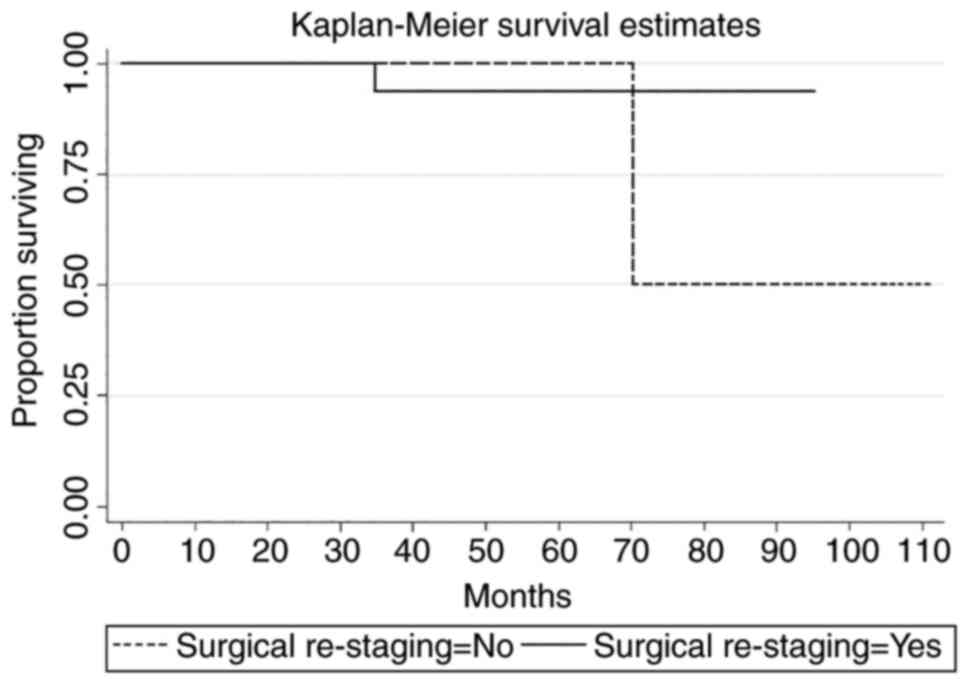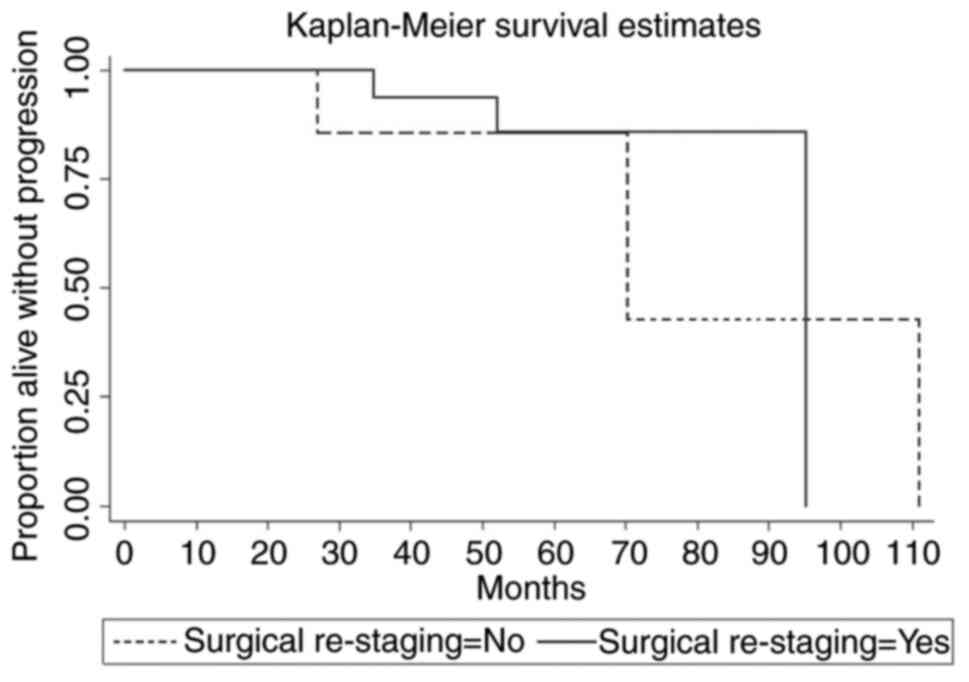|
1
|
Colombo N, Creutzberg C, Amant F, Bosse T,
González-Martín A, Ledermann J, Marth C, Nout R, Querleu D, Mirza
MR, et al: ESMO-ESGO-ESTRO consensus conference on endometrial
cancer: Diagnosis, treatment and follow-up. Int J Gynecol Cancer.
26:2–30. 2016. View Article : Google Scholar : PubMed/NCBI
|
|
2
|
Jorge S, Hou JY, Tergas AI, Burke WM,
Huang Y, Hu JC, Ananth CV, Neugut AI, Hershman DL and Wright JD:
Magnitude of risk for nodal metastasis associated with
lymphvascular space invasion for endometrial cancer. Gynecol Oncol.
140:387–393. 2016. View Article : Google Scholar : PubMed/NCBI
|
|
3
|
Wakayama A, Kudaka W, Matsumoto H, Aoyama
H, Ooyama T, Taira Y, Arakaki Y, Shimoji Y, Nakasone T, Nishihira
K, et al: Lymphatic vessel involvement is predictive for lymph node
metastasis and an important prognostic factor in endometrial
cancer. Int J Clin Oncol. 23:532–538. 2018. View Article : Google Scholar : PubMed/NCBI
|
|
4
|
Cohn DE, Horowitz NS, Mutch DG, Kim SM,
Manolitsas T and Fowler JM: Should the presence of lymphvascular
space involvement be used to assign patients to adjuvant therapy
following hysterectomy for unstaged endometrial cancer? Gynecol
Oncol. 87:243–246. 2002. View Article : Google Scholar : PubMed/NCBI
|
|
5
|
Chang SJ, Kong TW, Kim WY, Yoo SC, Yoon
JH, Chang KH and Ryu HS: Lymph-vascular space invasion as a
significant risk factor for isolated para-aortic lymph node
metastasis in endometrial cancer: A study of 203 consecutive
patients. Ann Surg Oncol. 18:58–64. 2011. View Article : Google Scholar : PubMed/NCBI
|
|
6
|
Briët JM, Hollema H, Reesink N, Aalders
JG, Mourits MJE, Ten Hoor KA, Pras E, Boezen HM, van der Zee AG and
Nijman HW: Lymphvascular space involvement: An independent
prognostic factor in endometrial cancer. Gynecol Oncol. 96:799–804.
2005. View Article : Google Scholar : PubMed/NCBI
|
|
7
|
Sari ME, Yalcin İ, Sahin H, Meydanli MM
and Gungor T: Risk factors for paraaortic lymph node metastasis in
endometrial cancer. Int J Clin Oncol. 22:937–944. 2017. View Article : Google Scholar : PubMed/NCBI
|
|
8
|
Vaizoglu F, Yuce K, Salman MC, Basaran D,
Calis P, Ozgul N and Usubutun A: Lymphovascular space involvement
is the sole independent predictor of lymph node metastasis in
clinical early stage endometrial cancer. Arch Gynecol Obstet.
288:1391–1397. 2013. View Article : Google Scholar : PubMed/NCBI
|
|
9
|
Zhang C, Wang C and Feng W:
Clinicopathological risk factors for pelvic lymph node metastasis
in clinical early-stage endometrioid endometrial adenocarcinoma.
Int J Gynecol Cancer. 22:1373–1377. 2012. View Article : Google Scholar : PubMed/NCBI
|
|
10
|
Borghesi Y, Narducci F, Bresson L, Tresch
E, Meurant JP, Cousin S, Cordoba A, Merlot B and Leblanc E:
Managing endometrial cancer: The role of pelvic lymphadenectomy and
secondary surgery. Ann Surg Oncol. 22 (Suppl 3):S936–S943. 2015.
View Article : Google Scholar : PubMed/NCBI
|
|
11
|
Scioscia M, Noventa M and Laganà AS:
Abnormal uterine bleeding and the risk of endometrial cancer: Can
subendometrial vascular ultrasound be of help to discriminate
cancer from adenomyosis. Am J Obstet Gynecol. 223:605–606. 2020.
View Article : Google Scholar : PubMed/NCBI
|
|
12
|
Laganà AS and Scioscia M: Endometrial
cancer in women with adenomyosis: An underestimated risk? Int J
Fertil Steril. 14:260–261. 2020.PubMed/NCBI
|
|
13
|
Concin N, Matias-Guiu X, Vergote I, Cibula
D, Mirza MR, Marnitz S, Ledermann J, Bosse T, Chargari C, Fagotti
A, et al: ESGO/ESTRO/ESP guidelines for the management of patients
with endometrial carcinoma. Int J Gynecol Cancer. 31:12–39. 2021.
View Article : Google Scholar : PubMed/NCBI
|
|
14
|
Harris KL, Maurer KA, Jarboe E, Werner TL
and Gaffney D: LVSI positive and NX in early endometrial cancer:
Surgical restaging (and no further treatment if N0), or adjuvant
ERT? Gynecol Oncol. 156:243–250. 2020. View Article : Google Scholar : PubMed/NCBI
|
|
15
|
Abu-Rustum NR, Yashar CM, Bradley K,
Campos SM, Chino J, Chon HS, Chu C, Cohn D, Crispens MA, Damast S,
et al: NCCN guidelines® insights: Uterine neoplasms,
version 3.2021. J Natl Compr Canc Netw. 19:888–895. 2021.
View Article : Google Scholar : PubMed/NCBI
|
|
16
|
Cardosi RJ, Cox CS and Hoffman MS:
Postoperative neuropathies after major pelvic surgery. Obstet
Gynecol. 100:240–244. 2002. View Article : Google Scholar : PubMed/NCBI
|
|
17
|
Volpi L, Sozzi G, Capozzi VA, Ricco M,
Merisio C, Di Serio M, Chiantera V and Berretta R: Long term
complications following pelvic and para-aortic lymphadenectomy for
endometrial cancer, incidence and potential risk factors: A single
institution experience. Int J Gynecol Cancer. 29:312–319. 2019.
View Article : Google Scholar : PubMed/NCBI
|
|
18
|
Cusano E, Myers V, Samant R, Sudai T,
Keller A, Le T, E C, Grimes S and Xu Y: Prognostic significance of
lymphovascular space invasion in the absence of lymph node
metastases in early-stage endometrial cancer. Int J Gynecol Cancer.
28:890–894. 2018. View Article : Google Scholar : PubMed/NCBI
|
|
19
|
Loizzi V, Cormio G, Lorusso M, Latorre D,
Falagario M, Demitri P, Scardigno D and Selvaggi LE: The impact of
lymph vascular space invasion on recurrence and survival in
patients with early stage endometrial cancer. Eur J Cancer Care
(Engl). 23:380–384. 2014. View Article : Google Scholar : PubMed/NCBI
|
|
20
|
Bosse T, Peters EEM, Creutzberg CL,
Jürgenliemk-Schulz IM, Jobsen JJ, Mens JWM, Lutgens LCHW, van der
Steen-Banasik EM, Smit VTHBM and Nout RA: Substantial
lymph-vascular space invasion (LVSI) is a significant risk factor
for recurrence in endometrial cancer-a pooled analysis of PORTEC 1
and 2 trials. Eur J Cancer. 51:1742–1750. 2015. View Article : Google Scholar : PubMed/NCBI
|
|
21
|
Cignini P, Vitale SG, Laganà AS, Biondi A,
Valentina Lucia La Rosa VL and Cutillo G: Preoperative work-up for
definition of lymph node risk involvement in early stage
endometrial cancer: 5-year follow-up. Updates Surg. 69:75–82. 2017.
View Article : Google Scholar : PubMed/NCBI
|
















